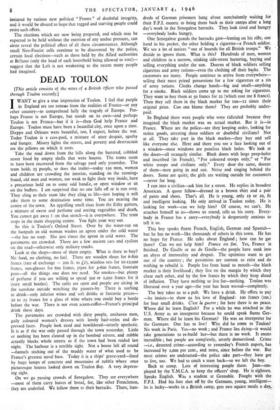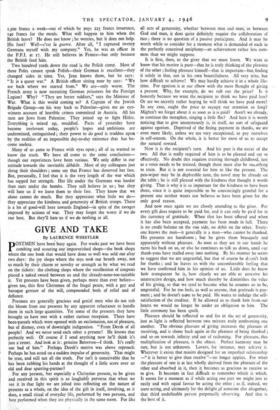DEAD TOULON
[This article consists of the notes of a British officer who passed through Toulon recently.]
IWANT to give a true impression of Toulon. I feel that people in England are too remote from the realities of France—or any other country—to comprehend fully the tragedy of Europe. Per-
haps France is not Europe, but stands on its own—and perhaps Toulon is not France—but if it is—then God help France and Europe. Toulon must have been a beautiful city, once upon a time. Dieppe and Orleans were beautiful, too, I expect, before the war. Today Toulon is a cess-pool, a mixture of utter despair, apathy and hunger. Misery lights the streets, and poverty and destruction are the pillows on which it rests.
Take the road down from the hills along the battered, cobbled street lined by empty shells that were houses. The trams seem to have been recovered from the salvage yard only yesterday. The tram holds 25 people, so does the trailer—today 15o men, women and children are crowding the interior, standing on the running- board, old men and women, too weak to fight their way inside, have a precarious hold on to some odd' handle, or open window or sit on the buffers. I am surprised that no one falls off or is run over.
They cling to their tram like they cling to life—just hoping it will take them to some destination some time. You are nearing the centre of the town. An appalling smell rises from the filthy gutters, a mixture of sweat and perfume and rotting vegetables and death. You cannot get away f:3m that stench—it is everywhere. The tram stops in the main shopping centre. You fight your way out.
So this is Toulon's Oxford Street. Over by the water-tap on the footpath an old woman washes an apron under the cold water —she has no soap. She just rinses the apron in cold water. The pavements are crowded. There are a few ancient cars and cyclists on the road—otherwise only military trucks.
Look at the shops—most of them empty. What is there to buy?
No food, no clothing, no fuel. There are wooden shoes for 6-800 francs (rate of exchange = zoo fr. to £t), wireless sets for 10-12,000
francs, sun-glasses for 600 francs, pipes for 4-60o francs, fountain pens—all the things one does not need. No smokes—but plenty of perfume if you are willing to spend 500 or t,000 francs for it (very small bottles). The cafés are open and people are sitting in the sunshine outside watching the passers-by. There is nothing to drink—only inferior wines and soft drinks at fantastic prices-
20 to 25 francs for a glass of wine where you could buy a bottle before the war. There is not even acorn-coffee—France's principal drink these days.
The pavements are crowded with dirty people, unshaven men, gaily coloured women's dresses with lovely hair-styles and de- pressed faces. People look tired and bewildered—utterly apathetic. It is as if the war only passed through the town yesterday. Little or nothing has been cleared up in the bombed streets, and rubble actually blocks whole streets as if the town had been raided last night. The harbour is a terrible sight. Not a house left all round —funnels sticking out of the muddy water of what used to be France's greatest naval base. Today it is a ships' grave-yard—lined by huge lumps of concrete and mountains of rubble where once picturesque houses looked down on Toulon Bay. A very depress- ing sight.
On we go passing crowds. of Senegalese. They are everywhere —most of them carry loaves of bread, for, like other Frenchmen, they are underfed. We follow them to their barracks. There, hun- dreds of German prisoners hang about nonchalantly waiting for their F.F.I. escorts to bring them back to their camps after a long day's work in the Senegalese barracks. They look tired and hungry —everybody looks hungry.
One Senegalese guards the barracks gate—leaning on his rifle, one hand in his pocket, the other holding a cigarette—a French soldier. We see a lot of notices "out of bounds for all British troops." We decide to ignore them. What is this? Hundreds of men, women and children in a narrow, stinking side-street bartering, buying and selling everything under the sun. Dozens of black soldiers selling cigarettes and army rations—even the clothing off their hicks. The customers are many. People continue to arrive from everywhere— selling their most prized possessions for a few cigarettes or a tin of army rations. Clocks change hands—big and small—anything for a smoke. Black soldiers come up to me asking for cigarettes. They want to buy them at 5o francs for 20 (which cost me 8 francs). Then they sell them in the black market for 100-42 times their original price. Can one blame them? They are probably under- paid.
In England there were people who were ridiculed because they imagined the black market was an actual market. But it is—in France. Where are the police—are they keeping order, looking for stolen goods, arresting these soldiers or doubtful civilians? Not at all. They take part in the black market—they buy and sell like everyone else. Here and there you see a face looking out of a window—most windows are paneless black holes. We look at the doors—all strangely similar. Black doors with large peep-holes and inscribed (in French), "For coloured troops only," or " For white troops and civilians only." Every door the same, dozens of them—men going in and out. Noise and singing behind the doors. Some are quiet; the girls are waiting outside for customers —never for long.
I run into a civilian—ask him for a street. He replies in broadest American. A queer fellow—dressed in a brown shirt and a pair of pants and shoes. That's all. He is young, only 19 or 20, fit and intelligent looking. He only arrived in Toulon today. He is looking for work—can we help him? Of course, we can't. He attaches himself to us—shows us round, tells us his story. Every- body in France has a story—everybody is desperately anxious to tell it us.
This boy speaks fluent French, English, German and Spanish— but he has no work—like thousands of others in this town. He has no hope for France. He talks about England ; how can he get there? Can we not help him? France est fini. Yes, France is- finished. De Gaulle or no de Gaulle—the people have sunk into an abyss of immorality and despair. The optimists want to get out of the country ; the pessimists are content to exist and do nothing to rebuild it. People live from hand to mouth—the black market is their livelihood ; they live on the margin by which they cheat each other, and by the few francs by which they keep ahead of inflation. They have nothing to live for—nothing. Toulon was liberated over a year ago—the year has been wasted—completely.
The boy takes us to a pub. We have a drink. He offers to pay —he insists—to show us his love of England: too francs (vas.) for four small drinks. C'est la guerre; for here there is no peace. Where did he learn English? For a while he was attached to the U.S. Army as an interpreter because he could speak fluent Ger- man. Where did he learn his German? He was an interpreter for the Germans. One has to live! Why did he come to Toulon? No work in Paris. Yes—no work ; and France lies dying—it would take generations to re-build her—but there is no work. It seems incredible ; but people are completely, utterly demoralised. Crime —i.e., detected crime—according to yesterday's French papers, has increased by t,000 per cent., and more, since before the war. But most crimes are undetected—the police take part—they have got to live, too. We had to catch a tram back—so we left the boy.
Back to camp. Lots of interesting people there. Jean—em- ployed by the Y.M.C.A. to keep the officers' shop. He is eighteen. Speaks English. Was a student at Grenoble. Fought with the F.F.I. Had his foot shot off by the Germans, young, intelligent— he is lucky—works in a British camp, gets two square meals a day,
1,500 francs a- week—out of whiclr he pays 225 francs insurance, 140 francs for the -meals. What will happen to him when the British leave? He does not know; he worries, but it does not help. His foot? Well—c'est la guerre. After all, " I captured twenty Germans myself with my company." Yes, he was an officer in the F.F.I. at 17. He still believes in France—but only because the British feed him.
Two hundred yards down the road is the Polish camp. Most of these Poles cannot speak Polish—their German is excellent—they changed sides in time. Yes, Jean knows them, but he says: " It is a queer war." A British officer sitting near by says: " We are back where we started from." We are—only worse. The French army is now recruiting German prisoners for the Foreign Legion! Why? "They are better soldiers," says the Minister of War. What is this world coming to?' A Captain of the Jewish Brigade Group—on his way back to Palestine—gives me an eye- witness account of horrible crimes committed in Austria. All his men are Jews from Palestine. They joined up to fight Hitler. Everything is mixed up, muddled. Pacts of yesterday have become irrelevant today, people's hopes and ambitions are undermined; extinguished ; their power to do good is trodden upon by the realities of an impossible day-to-day existence that has be- come useless.
Many of us game to France with eyes open ; all of us wanted to know the truth. We have all come to the same conclusions— though our experiences have been various. We only differ in our attitude towards the inevitable debacle. Most of my colleagues just shrug their shoulders ; some say that France has deserved her fate. But, personally, I feel that it is the very length of the war which has sapped her strength. Her life under the Germans was harder than ours under the bombs. They still believe in us ; but they will hate us if we leave them to their fate. They know that we alone cannot do much. But they appreciate what little we do— they appreciate the kindness and generosity of British troops. There is a lot of good-will here towards England—in spite of the ravages imposed by actions of war. They may forget the morst if we do our best. But they'll hate us if we do nothing at all.
































 Previous page
Previous page